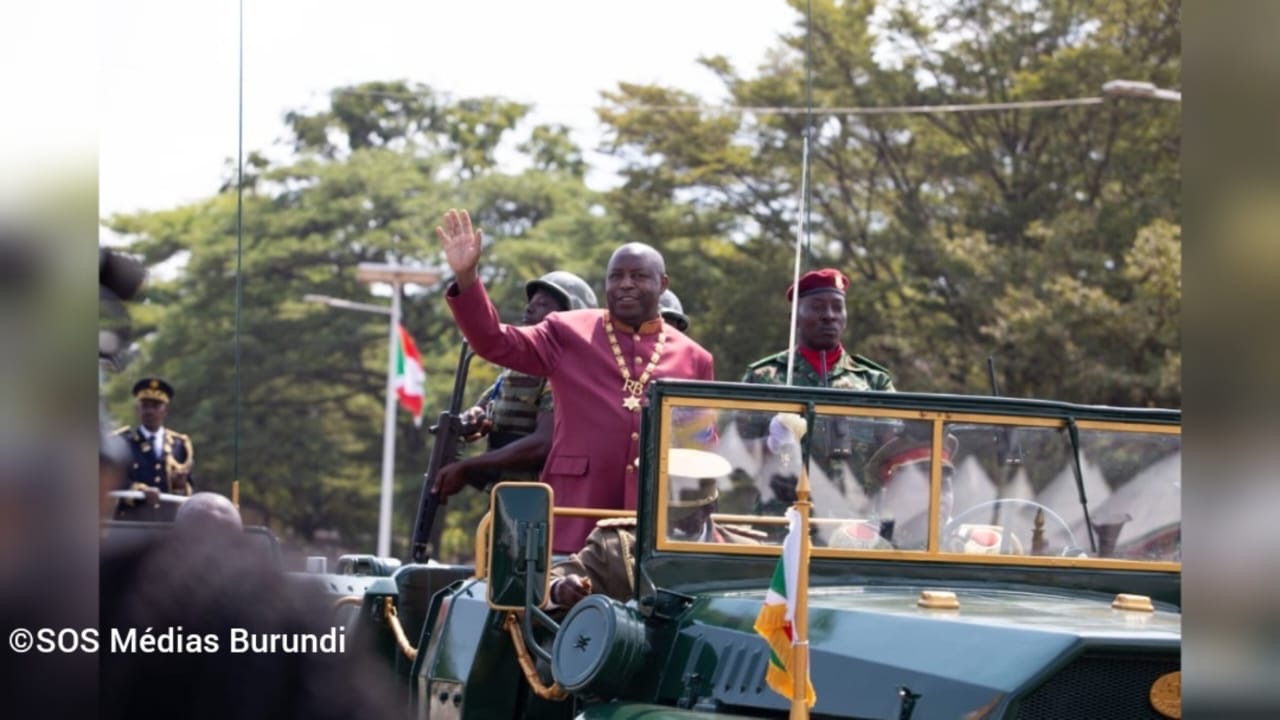Burundi : 63 years of independence, but a democracy under lockdown

SOS Médias Burundi
Bujumbura, July 1, 2025 – As Burundi celebrates its 63rd anniversary of independence on July 1, a deep unease is sweeping through the population. Political repression, widespread poverty, closed borders : Burundians denounce a confiscation of freedoms and a government that ignores their suffering. A national disillusionment.
Across all the provinces of the small east African nation, the situation is bitter. Citizens denounce an oppressive political climate, failing governance, and rampant impoverishment. In the background, a political space is locked in favor of the CNDD-FDD, the ruling party for two decades, accused of having confiscated the democratic gains of the 1990s.
According to opposition representatives, the recent legislative and district elections were nothing more than a charade. The Burundi Bwa Bose coalition speaks of an « electoral hold-up » that has buried the last hopes for democracy. The same observation is made by the CNL and its long-time leader, Agathon Rwasa, who was excluded from these elections. They consider these elections to be a veritable « electoral coup d’état, » comparable to past military coups.
The Constitutional Court is also criticized for having validated the results despite numerous protests. « There is no longer any separation of powers or judicial independence, » denounced a UPRONA official. In both cities and rural areas, the population lives in fear of a regime accused of ruling by terror.
In Gitega (the political capital), a shopkeeper sums up the prevailing bitterness :
« We are asked to dance to celebrate independence, but our plates are empty and our children have no medicine. What independence? »
A stifled economy
On the economic front, the situation is equally worrying. Inflation is approaching 45%, according to a macroeconomics specialist, crippling the purchasing power of a population already stricken by poverty. Agricultural production, the main source of income in almost all regions, is stagnating due to a lack of coherent policies.
In Rugombo, in the northwestern province of Cibitoke, a resident testifies :
« We no longer have enough to feed our families. Even the most basic products are becoming inaccessible. »
Cases of corruption and embezzlement of public funds are described as systemic. These practices are even plaguing local governments, according to several independent sources.
Health and education : sacrificed sectors
On the social level, the situation is devastating. Health centers are deprived of medicines and staff. The maternal and infant mortality rate continues to rise.
In secondary schools, the infrastructure is dilapidated, and textbooks are in desperately short supply. « The regime boasts of the country’s sovereignty, but fails to guarantee basic services, » accuses a teacher from Kayanza in the north.
A young farmer from Cibitoke denounces :
« We live in constant fear. This is not the freedom Rwagasore wanted for us. »
Diplomatic isolation and border asphyxiation
Tense relations with Rwanda are further exacerbating the situation. Traders denounce the border closure, which deprives local populations, especially in border areas, of their main source of income.
« This closure is asphyxiating us, » confides a teacher, forced to supplement his salary with cross-border activities that are now impossible.
Burundi’s involvement in the conflict in the DRC against the M23 rebellion is also causing concern. A former Burundian officer is calling for an immediate withdrawal, believing the country has nothing to gain by interfering in a foreign war. He also deplores human losses among the Imbonerakure, members of the CNDD-FDD youth league, sent to the front.
Betraying the ideals of independence
Faced with this bleak picture, few defend the CNDD-FDD’s record. A local dignitary attempts to downplay the criticism, citing an « inclusive electoral process » and efforts to consolidate independence and democracy. But his words are hardly convincing.
« This regime has betrayed the ideals of Louis Rwagasore, » retorts an octogenarian, a former UPRONA activist. For him, the CNDD-FDD has turned its back on the principles of unity, peace, and power-sharing enshrined in the Arusha Agreement of August 2000. Prince Louis Rwagasore is recognized as the hero of Burundi’s independence.
A democracy under terror
Human rights defenders speak of a democracy « run by terror. » They document cases of torture, kidnappings, and extrajudicial executions. One of them, based in the country for over ten years, fears a descent into hell if nothing changes.
He warns of the growing exodus of opposition members, forced into exile in neighboring countries. This silent departure speaks volumes about the desperation of a population in search of justice, freedom, and dignity.
A resident of Rumonge (southwest) calls out :
« We don’t need speeches. We need concrete changes. That is true independence. »
Yet, President Évariste Ndayishimiye continues to paint a largely positive picture, going so far as to declare :
« Burundi has never been so sovereign and Burundians have never been so happy. »
His detractors accuse him of being insensitive to the suffering of Burundians and of « openly mocking them. »

